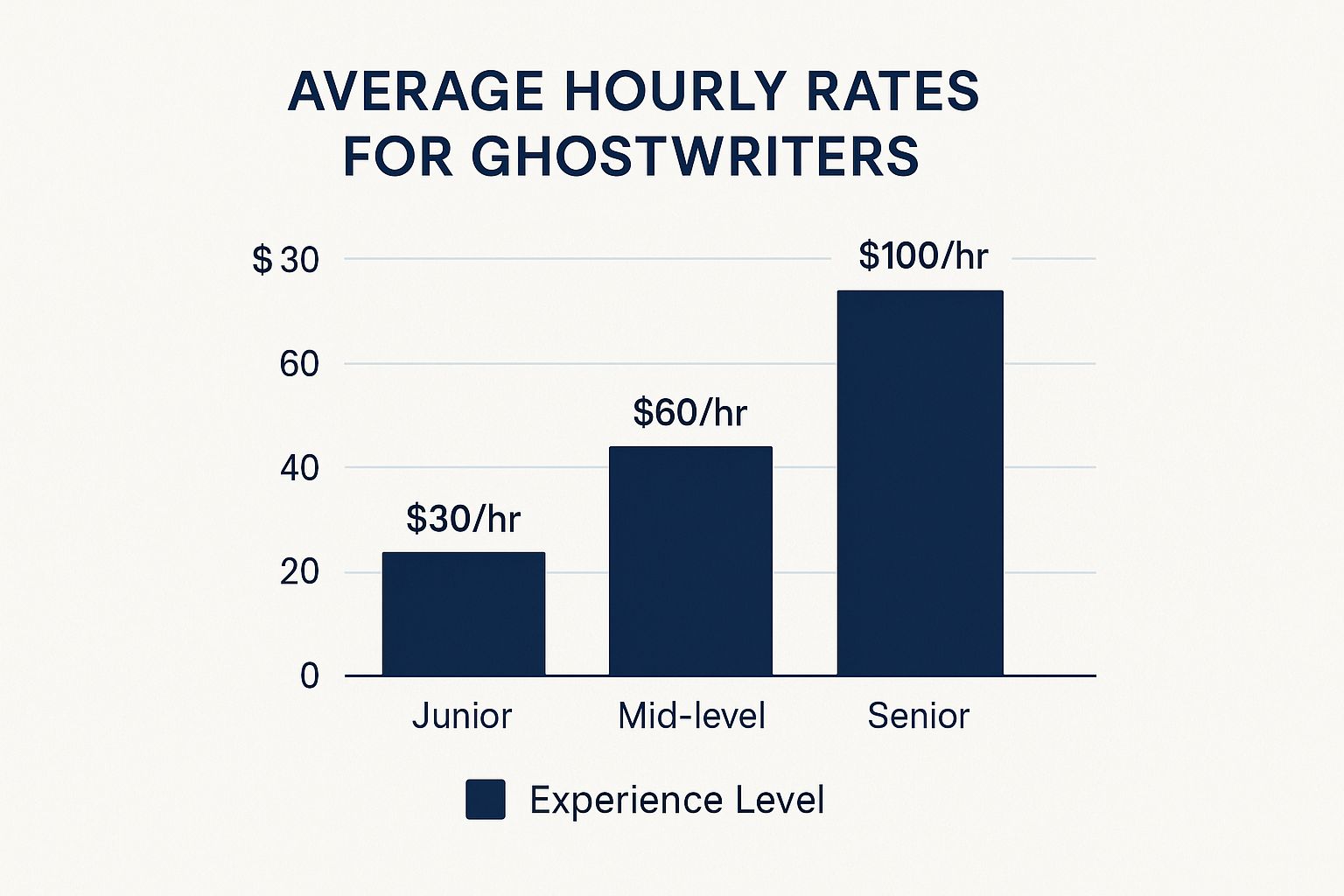Understanding What You're Really Paying For

Asking about ghostwriting costs is a bit like asking about the price of a house. You wouldn't expect a simple answer without knowing more details, right? It's not just about size; it's about the whole package. Are we talking a cozy cabin or a luxury villa?
Similarly, a short blog post and a hefty novel are both writing projects, but the investment involved is drastically different. It's essential to understand what you're really paying for when you hire a ghostwriter.
It's not just the words themselves; it's the skill, the time, and the creative process that transforms those words into something engaging. A blog post might cost $500 because it requires less research and a faster turnaround.
A memoir, on the other hand, could cost $50,000. This reflects the extensive work involved: lengthy interviews, meticulous fact-checking, and the delicate art of capturing a life story authentically.
Experience and Expertise
The ghostwriter's experience also significantly influences the cost. Imagine commissioning a portrait: a beginner might charge less, but a seasoned artist with a distinctive style and years of honed technique will command a premium.
A less experienced ghostwriter may offer lower rates, but a seasoned pro brings a wealth of knowledge. This includes everything from plot development to genre-specific nuances, often leading to fewer revisions and a smoother experience.
Project Complexity
The complexity of your project is another key factor. Is it a simple how-to guide or a detailed technical document? A custom-built race car costs more than a standard family sedan for a reason.
Projects requiring highly specialized knowledge or extensive research naturally come with a higher price tag. This isn't just about writing; it's about the time invested in gathering information, conducting interviews, and ensuring accuracy.
Cost Ranges and Considerations
Taking all these factors into account—project type, experience level, and complexity—ghostwriting costs can range from $0.20 to $1.50 per word. For a 50,000-word nonfiction book, that translates to $10,000–$75,000.
Highly sought-after ghostwriters, particularly those with bestselling titles under their belts, can command fees of $100,000 to $250,000+ for major projects. Discover more insights on ghostwriting costs.
Ultimately, understanding these factors allows you to make an informed decision about the right investment for your specific needs and objectives.
Decoding Ghostwriter Pricing Models That Actually Work
So, how much does a ghostwriter cost? It's a question with a nuanced answer. Think of it like dining out: sometimes you're in the mood for a prix fixe menu, other times you prefer ordering à la carte. Similarly, ghostwriters offer different pricing models that can greatly influence your total investment. Generally, you'll encounter three main approaches: per-word rates, flat fees, and hourly billing.
Per-Word Rates: Scaling With Your Project
Per-word pricing is a common and straightforward model. Imagine buying fabric: the more you need, the more it costs. This approach makes it relatively simple to adjust the scope of your project. It's often favored for projects with well-defined parameters, like blog posts or articles where the word count is fairly static.
Flat Fees: Budget Certainty
When budget predictability is your top priority, a flat fee arrangement might be the best fit. It's like buying a furniture set: the price tag is clear from the outset. This model excels for projects with concrete deliverables, such as a book or ebook of a specified length. The upfront clarity regarding cost can be invaluable for planning and sidestepping unexpected expenses.
Hourly Billing: For Evolving Projects
Hourly billing offers adaptability for projects that may take shape organically throughout the writing process. Picture hiring a consultant: you pay for their time and expertise. This approach suits projects with flexible scopes, such as developmental editing or research-intensive writing where the final word count is less predictable. Keep in mind, when you hire a ghostwriter, understanding the legal aspects of working with an independent contractor agreement is essential.

This infographic provides a visual representation of average ghostwriting hourly rates based on experience. Junior writers generally command around $30/hour, mid-level writers around $60/hour, and senior writers around $100/hour. As you can see, experience plays a key role in determining hourly rates, reflecting the writer's accumulated expertise and proven success. For a deeper dive into the writing process, check out our guide on the book writing process.
To help you further understand the nuances of each pricing model, let's take a closer look at a comparison table.
To help you choose the best pricing model for your needs, the following table breaks down the pros, cons, and ideal use cases of each approach.
| Pricing Model | Best For | Average Range | Pros | Cons |
|---|---|---|---|---|
| Per-Word | Blog posts, articles, short-form content | $0.10 – $2.00 per word | Simple to scale, predictable cost per word | Can be challenging to estimate total cost upfront, may not be ideal for complex projects |
| Project-Based (Flat Fee) | Books, ebooks, defined-scope projects | Varies greatly depending on project scope | Predictable total cost, simplifies budgeting | Less flexibility if project scope changes |
| Hourly | Developmental editing, research-heavy projects, ongoing content creation | $30 – $150+ per hour | Flexible for evolving projects, allows for adjustments along the way | Total cost can be difficult to predict, requires careful tracking of hours |
Each pricing model has its own set of strengths and weaknesses. Choosing the right one is about aligning your project's specific needs and budget with the best-suited approach.
Real Project Costs: From Blog Posts to Bestsellers

Figuring out ghostwriting costs can feel a bit like browsing a crowded market. You'll see a wide array of prices, each reflecting the writer's experience and the project's complexity. A short blog post, something that doesn't need a ton of research and can be turned around quickly, might cost somewhere between $50 and $1,000. Think of it like buying something off the rack – fast and easy.
For example, a 500-word blog post might land in the $100-$300 range. This covers the writer's time, the research involved, and their writing skills for a relatively straightforward piece.
But more involved projects, like white papers or ebooks, require a larger investment.
Longer-Form Content and the Price of Expertise
As the project gets bigger, so does the price tag. A detailed ebook that needs deep research and specialized knowledge can run you between $1,000 and $10,000 or more. This is more like getting a custom-tailored suit – made to your exact specifications and requiring more skill and time.
For instance, a 5,000-word ebook could cost $2,000-$5,000. This reflects the extra time commitment and the greater need for research and writing. It really highlights how the length of a project affects the cost. For a better understanding of cost structures, check out typical Pricing models. Highly specialized content like technical manuals or academic papers, which need specific expert knowledge, can cost even more.
The Book Deal: A Different Ballgame
Ghostwriting a book is a major commitment for everyone involved. That's why books typically cost more than shorter pieces. The price for a ghostwritten book can range from $5,000 to $100,000 or more, based on a number of factors. This is like building a house – a complicated process with lots of moving parts.
Ghostwriting fees also change depending on the type of book. Nonfiction books by professional ghostwriters might cost between $6,500 and $42,000, novels can fall between $3,500 and $16,000, and picture books are usually in the $1,500 to $5,000 range. This variation comes from the different writing styles and expertise required for each genre. Discover more insights. Things like the book's length, the genre, how much research is needed, and the ghostwriter's background all contribute to the final cost.
To give you a better idea of the cost breakdown, let’s take a look at the table below:
Ghostwriting Costs by Project Type
Comprehensive breakdown of typical costs for different types of ghostwriting projects from blog posts to full-length books
| Project Type | Word Count Range | Price Range | Timeline | Complexity Level |
|---|---|---|---|---|
| Blog Post | 500 – 1,500 | $50 – $1,000 | 1-7 days | Low |
| Ebook | 5,000 – 20,000 | $1,000 – $10,000+ | 2 weeks – 3 months | Medium-High |
| White Paper | 2,000 – 5,000 | $500 – $5,000 | 1-4 weeks | Medium |
| Nonfiction Book | 40,000 – 80,000+ | $6,500 – $42,000+ | 6 months – 1 year+ | High |
| Novel | 60,000 – 100,000+ | $3,500 – $16,000+ | 6 months – 1 year+ | High |
| Picture Book | 500 – 1,500 | $1,500 – $5,000 | 2 weeks – 2 months | Low-Medium |
As you can see, the price range can vary quite a bit based on the type of project. Keep in mind these are just estimates and the final cost will depend on the specifics of your project and the ghostwriter you choose.
Why Experience Commands Premium Rates
Ever wonder why some ghostwriters charge a premium? Think of it like choosing a restaurant. A new bistro might offer a decent meal, but a renowned chef with decades of experience commands higher prices. It's not just about the years they've put in; it's about the refined skills and consistent excellence they bring to the table.
A newbie ghostwriter might charge $0.10 per word, which may seem appealing. But are you getting the best value? An experienced professional charging $2.00 or more per word offers a host of advantages beyond the writing itself. They have mastered various writing styles, from crafting compelling narratives for fiction to capturing authentic voices in memoirs. This translates to quicker turnaround times, fewer revisions, and an ability to anticipate potential challenges before they become major hurdles.
If ebook creation is part of your ghostwriting services, guiding your clients towards the best platforms to sell ebooks is a key part of your value proposition.
What Premium Rates Really Buy You
Experience also brings intangible benefits that are hard to quantify but immensely valuable. Seasoned ghostwriters often have a strong network of industry contacts. This can be a game-changer if your project requires specific expertise or access to particular resources. Think about writing a non-fiction book: accuracy and credible sources are crucial. A seasoned professional can tap into their network for fact-checking, expert interviews, and more. Their track record also instills confidence in clients, especially with sensitive or complex projects.
Balancing Cost and Value
Let's take a look at how a ghostwriter's experience might be showcased on their LinkedIn profile:
This hypothetical profile highlights specializations, publications, and client testimonials—all elements that build credibility and justify a higher rate.
So, when does it make sense to invest in top-tier talent versus a newer ghostwriter? A newer writer might be a good fit for simpler projects like blog posts or website copy. But when you need nuanced writing, in-depth research, and a truly polished final product, the expertise of a seasoned professional becomes invaluable. It all comes down to balancing cost with the value you're receiving. Choosing the right ghostwriter is an investment in the success of your project.
Hidden Costs That Can Derail Your Budget

When you're setting a budget for a ghostwriter, it's tempting to fixate on that initial quote. But much like planning a home renovation, hidden costs can pop up in ghostwriting and seriously impact your total investment. Knowing about these potential extras beforehand is key to avoiding sticker shock and making sure you're really prepared for the full project cost.
Research Expenses: Digging Deeper
One common hidden cost is research expenses. Some ghostwriters bundle basic research into their fees, but deep dives or specialized research often come with an extra charge. Think of it like hiring a private investigator: the more complicated the case, the more time they'll need to investigate, leading to a bigger bill. For instance, a book needing extensive historical research or interviews with several experts will likely have added research fees.
Imagine writing a book about the culinary traditions of ancient Rome. A ghostwriter might include basic online research in their initial fee. However, if you want them to consult with historians, translate ancient texts, or visit archeological sites, those are specialized research tasks that will likely incur additional costs.
Rush Fees: The Price of Urgency
Another thing to consider is rush fees. If you need your project finished faster than the usual turnaround time, expect to pay a premium. Like paying extra for expedited shipping, a tighter deadline usually means the ghostwriter needs to reschedule other work or put in longer hours, which bumps up the cost. Making your timeline clear from the get-go is crucial for accurately accounting for any potential rush fees. You might find this helpful: Check out our guide on the cost to publish a book.
Let's say you have a blog post due in two weeks, but suddenly you need it in two days. That shortened timeframe might require the ghostwriter to work evenings and weekends to meet your deadline, resulting in a rush fee.
Revisions and Rewrites: Refining Your Vision
Most ghostwriters include a set number of revisions in their original quote. However, substantial rewrites or big changes to the project's initial scope can result in extra charges. It's akin to asking a contractor to change a room's layout after construction has already started. This requires more work and resources, meaning added cost. Having a solid grasp of your vision and sharing it clearly upfront can help keep major revisions to a minimum.
For example, if you initially requested a 5,000-word ebook, but later decide you want a 10,000-word ebook, that's a significant change in scope. It essentially doubles the workload, and the ghostwriter will likely charge accordingly.
Specialized Expertise: Niche Knowledge Comes at a Price
Finally, specialized expertise can also influence your project's cost. Ghostwriters with specific industry knowledge or technical skills often command higher rates. This is similar to seeing a specialist doctor instead of a general practitioner. Their specialized knowledge and experience come at a premium. If your project needs expertise in a particular area, be prepared to invest accordingly.
If you're writing a book about quantum physics, you'll need a ghostwriter with a strong science background. This specialized knowledge warrants a higher rate than a ghostwriter who primarily writes fiction or general non-fiction.
Protecting Your Budget: Planning for Success
By understanding these potential hidden costs and accounting for them early on, you can sidestep budget overruns and ensure a smooth, successful collaboration with your ghostwriter. This involves clearly defining your project's scope, effectively communicating your timeline, and discussing any potential additional costs with your ghostwriter before the project kicks off.
Smart Strategies for Maximizing Your Ghostwriting Investment
Finding the right ghostwriter can feel like navigating a minefield. The most expensive isn't always the best, and the cheapest option? Well, that can sometimes be the most costly mistake of all. Understanding the delicate balance between price and value is key to a successful ghostwriting partnership. Think of it like investing in the stock market: you wouldn't throw all your money at the flashiest, most talked-about stock without digging into its fundamentals, would you?
The same principle applies to ghostwriting. A truly informed decision goes beyond the initial quoted rate.
Evaluating Quality Over Cost
So how do you ensure you're getting true value for your money? It all starts with a crystal-clear understanding of your own needs. Are you simply looking for someone to translate your thoughts into written words? Or do you need a skilled wordsmith, a storyteller who can weave your ideas into a compelling narrative that truly captures your unique voice?
Just as a skilled architect designs a house to perfectly complement the surrounding landscape, a good ghostwriter tailors their craft to your specific goals. They become an extension of your vision.
Don't be swayed by marketing hype and dazzling promises. Instead, delve into the writer's portfolio. Has their previous work resonated with readers? Do they possess experience in your particular genre? This is where client testimonials and case studies become invaluable resources. Hearing firsthand accounts of positive experiences from past clients can instill confidence in the writer's ability to deliver on their promises. It's like getting a personal recommendation from a trusted friend.
Structuring Agreements That Motivate Quality
A well-structured agreement acts as a safeguard, protecting both you and the ghostwriter. Clearly defined deliverables, payment milestones, and revision policies prevent misunderstandings and potential conflicts down the line. Think of it as a detailed roadmap for your project, guiding everyone involved and helping to avoid costly detours.
For instance, linking payments to specific milestones—like the completion of a chapter, a first draft, or final revisions—motivates the writer and empowers you with a sense of control over the entire process. It's a mutually beneficial arrangement, a true win-win.
A robust agreement also addresses the inevitable: scope changes. Just as adding a room to a house after construction has begun invariably adds to the overall cost, alterations to a writing project midway can impact both the budget and the timeline. Having a pre-agreed plan for such scenarios prevents unpleasant surprises and keeps the project on track.
Recognizing True Value and Avoiding Hype
How can you tell if you're potentially overpaying for a ghostwriter? One telltale sign is a writer who invests more time and energy in self-promotion than in honing their craft. Another red flag is a writer who seems hesitant to discuss the intricate details of your project or rushes through the initial consultation.
Remember, negotiation isn't simply about haggling for a lower price; it's about fostering a mutually beneficial relationship built on trust and transparency. A skilled and experienced ghostwriter is open to discussing your budget and exploring creative ways to work within your financial constraints. They recognize that a successful partnership ultimately benefits everyone involved.
When you invest in a ghostwriter, you're investing in the success of your project. Choosing wisely ensures a substantial return on that investment.
Your Roadmap to Smart Ghostwriting Investments
So, you’re thinking about hiring a ghostwriter. Excellent! Understanding the costs is a great first step. But like any important investment, you need a solid plan to ensure you get the best return. Think of this section as your personalized roadmap to navigating the world of ghostwriting and making smart decisions every step of the way.
Crafting a Realistic Budget
Imagine planning a cross-country road trip. You wouldn't just jump in the car and start driving, would you? You'd map out your route, estimate gas costs, and factor in unexpected expenses like meals and maybe even a flat tire. Budgeting for a ghostwriter is similar. You need to consider several factors to create a realistic budget.
Think about the length of your project, the word count, the level of research required, and the writer's experience. Naturally, a 50,000-word business book will require a larger investment than a 1,000-word blog post. If your project requires deep research or specialized knowledge in a particular field, be sure to account for that from the beginning.
Balancing Cost and Quality
Just like furnishing a home, you need to balance cost and quality. You might splurge on a beautiful sofa for the living room, the heart of your home, but choose more budget-friendly options for the guest room. The same principle applies to ghostwriting.
If your project is a core element of your business strategy – perhaps a book that establishes you as a thought leader – investing in a highly experienced professional might be essential. For less critical projects, a newer ghostwriter might offer excellent value while still delivering high-quality work.
Building Strong Working Relationships
Think of your relationship with your ghostwriter as a collaborative journey. A detailed roadmap, or in this case, a well-defined agreement, will help you navigate the process smoothly. This agreement should clearly outline deliverables, timelines, and payment milestones, keeping everyone on the same page.
Regular communication is key. Think of these check-ins as pit stops on your road trip, allowing you to refuel, assess progress, and make adjustments to the route if necessary. This proactive approach not only minimizes surprises but also fosters a strong, productive working relationship. You might find this helpful: How to Become a Published Author.
Getting the Most From Your Investment
Whether your budget is large or small, maximizing your return requires careful planning and open communication. Think of it like tending a garden. With consistent effort and nurturing, even a small plot can yield an abundant harvest.
Establish clear benchmarks to track progress, provide constructive feedback, and be open to the writer's expertise. This collaborative approach helps you extract the most value from your investment, no matter the size.
Ready to begin your publishing journey? BarkerBooks offers comprehensive publishing services, from ghostwriting and editing to cover design and global distribution. Transform your manuscript into a professionally published book with BarkerBooks.
